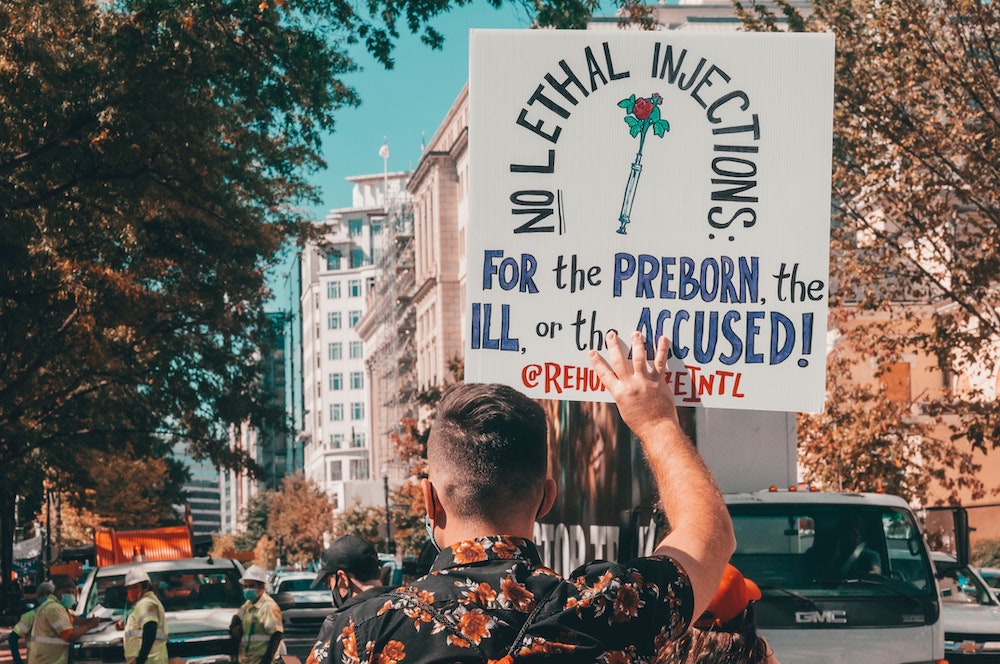
To think we are a one-issue church is simplistic and a denial of all we profess by our baptism. (Unsplash Maria Oswalt)
Finally, the election is behind us; but so much work lies ahead. From my personal perspective, one of the biggest issues the church has to grapple with now is our pro-life stand. It has been the cause of so much division among us.
Let's be honest. Allowing pro-life to be defined as a one-issue concern has torn us apart. I believe being pro-life can be one of our most beautiful unifying beliefs, so I have to ask myself how in the world have we allowed this teaching to be so watered down that it has become the source of our division?
I was disheartened to hear Joe Biden being called a "Catholic in name only," when he appears to be a man who truly relies on his faith to mold his actions. That seemed a harsh criticism about someone who so often approaches our same altar to receive and walk away with the same Jesus and who professes to belong to the same body of Christ.
My congregation's charism is healing and reconciliation, so the past years have truly hurt my heart. I felt most dismayed at how our church has become so divided with pre-election rhetoric that filled emails and tweets proclaiming those who work to oppose abortion are much more pro-life than those who work for justice.
One email I received said that Catholics who voted for Biden would be condemned to hell. Really? Is that honestly how we think God sees it? My God believes there is life after birth, life that Catholics are also responsible to protect. My God believes life is a gift at every stage, and we are called to protect the dignity of that life across the board.
Advertisement
To think we are a one-issue church is simplistic and a denial of all we profess by our baptism. At baptism, we proclaim we are each made in the image and likeness of God; therefore, it is our primary responsibility to be the face of God in the world and to reach beyond ourselves to care for all God's children. Rather than taunting, "God loves those I defend more that God loves those you defend," perhaps a way back to unity is for each of us to reflect on all the hopes God has for our world and the delight God has when any one of us tries to make those hopes real.
Is abortion a life issue? Of course it is. But so is being indifferent to the number of deaths from COVID-19, putting children in cages, giving the impression that those from "shit hole" countries who happen to be brown or black can be ignored, finding anything good in the white supremacy movement, bullying, making fun of the disabled, showing disrespect for women and using them to further pleasures, being so concerned about our own wealth that we dismiss the more vulnerable among us, making enemies of persons simply because they disagree with us, feeding and nurturing division.
I often reflect that I can be forgiven many wrong doings, but changing the message of the Gospel to match my political agenda is not one of them. Clearly, the Gospel shows Christ reached out to all. His life preached healing of every kind. He wants us to work together — not in competition. Jesus came so that "all may be one." So if we're Catholic, let's stop with the name calling and taking the righteous position: "I'm more Catholic than you are." The election may be over, but our work toward unity has only just begun.
Several years ago, I represented my bishop at a national Catholic pro-life conference in Washington, D.C., sponsored by the U.S. Conference of Catholic Bishops. At that meeting, a Republican strategist was invited by the organizers to speak to the group. He clearly bragged about the Republican Party's strategy to divide the Catholic Church by reducing the pro-life movement to solely an anti-abortion movement. He told us that the Republican goal was to deliberately cast anti-abortionists as the true Catholics and those who support social justice and Catholic social teaching as "the enemy" — as the "Catholics in name only." Notice this narrowing came from politicians — not church teaching. To say the audience was outraged and stunned would be an understatement.
But isn't this exactly what's happened? So many — and heaven help us, this includes some of our bishops — have bought more into that political divide than the unifying concept of being pro-life. The question isn't "What are we doing about one issue, but in today's broken world, how are we stretching beyond a political definition to truly proclaim the full pro-life message?
To be pro-life is to find our own gifts and for each of us to use those gifts to further that portion of life we feel best equipped to serve. Where do you think the church would be now if our bishops had challenged all of us to be pro-life — not by forcing one legal issue down our throats, but instead by helping us shape attitudes and hearts that encouraged each of us to name those life issues where our gifts could make the most difference?
Many name and use their gifts to find ways to protect the unborn — and that is surely a wonderful, beautiful gift; others like Joe Biden have found their gift in serving in government, passing laws for the most vulnerable among us. That too is a marvelous gift. Working together for the whole of life — not ignoring any life — is precisely what makes us the body of Christ in our world.
Naming how my gifts can promote and defend life in no way gives me permission to ignore the other stages of life or to think that my issue fully and completely defines what it means to be pro-life. None of us can protect all of life; but think of the lives we could protect if we acted together. Think of the missed opportunities because we bought into a political definition of being pro-life when we could have been encouraging and welcoming that spark of hope each of us was providing to show respect for life in its broadest sense. We are not enemies; our gifts complement one another. There are many parts, but we are all one Body.
Only when we say life matters across the board — every stage counts — that a life is a life is a life is a life, do we truly witness what it means to be the body of Christ in our world. This challenges all of us to a broader more beautiful stand for life — not just for one stage and certainly not for one that would discount all the others.
It seems to me that if we believe only one stage of life is worth fighting for but fail to see how every stage is connected, we risk being more evangelical than Catholic.
[Donna Gunn is a member of the Sisters of St. Joseph of Carondelet, St. Louis Province. She has had a varied career in education at all levels and as a gerontologist. She served eight years in Community Leadership and spent 18 years in the Diocese of Jackson, Mississippi — with one of her tasks being the bishop's liaison to Congress and to the Mississippi Legislature.]







